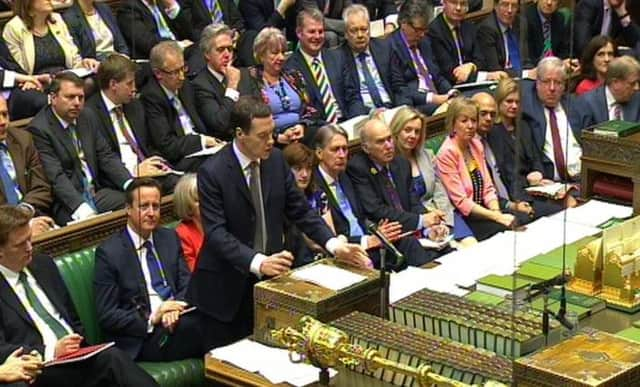Budget 2015: George Osborne urged to explain cuts


The Institute for Fiscal Studies (IFS) said the Chancellor should spell out how he intends to find £12 billion of savings from welfare when he has only identified £2bn.
Forecasts from the Office for Budget Responsibility (OBR) suggest the plans to cut the deficit before ending austerity a year early will mean a tightening squeeze followed by a spending splurge. Analysis suggests the cuts in 2016-17 and 2017-18 of more than 5 per cent would be twice the size of any so far by the coalition.
Advertisement
Hide AdAdvertisement
Hide AdIFS director Paul Johnson said: “The Chancellor argues that, because he is committed to £12bn of welfare cuts and £5bn of anti-tax avoidance measures, the required cuts to public service spending are much more modest.
“But if he really wants us to believe that, he needs to be more explicit about
how he actually thinks he can cut welfare spending and raise substantial additional sums from clamping down on tax avoidance.”
He added: “It is a terrible shame that, despite all the mass of information, I am left guessing. Whitehall departments are going to have to plan for some dramatically different scenarios, one of which they will have to implement in just 12 months’ time.”
Mr Osborne said in his Budget speech on Wednesday that he was taking Britain “one more big step on the road from austerity to prosperity”.
He said that because national debt was now expected to be falling a year earlier than previously expected, the squeeze on public services would end a year earlier too, and it would grow in line with the economy from 2019-20.
OBR forecasts suggest this would mean a planned surplus for that year falls from £23bn expected at the time of last December’s Autumn Statement to £7bn.
Mr Johnson said: “The apparent change in economic philosophy in the three months is pretty remarkable.”
Advertisement
Hide AdAdvertisement
Hide AdThe Chancellor’s pledge appeared designed to blunt the political impact of the OBR’s analysis of his previous plans, which would have seen public spending as a proportion of gross domestic product fall to its lowest level since the 1930s.
The coalition had been stung by suggestions that the squeeze raised the spectre of a bleak future for Britain comparable to the poverty described in George Orwell’s pre-war Road To Wigan Pier.
Mr Johnson said of the new plans: “Put the implied increase in public service spending in 2019-20 together with the cuts beforehand and you get what OBR chief Robert Chote calls a ‘rollercoaster’ ride for public service spending.
“The cuts of more than 5 per cent implied in each of 2016-17 and 2017-18 are twice the size of any year’s cuts over this parliament.”
He said the Chancellor was right to protest that this did not take account of planned savings to be made from welfare cuts and tax avoidance measures.
“But it is now almost two years since he announced his intention of cutting welfare spending by £12bn,” he said.
“Since then the main announcement has been the plan not to cut anything from the main pensioner benefits.
“We have been told about no more than £2bn of the planned cuts to working-age benefits.
Advertisement
Hide AdAdvertisement
Hide Ad“And remember, apparently the ‘plan’ is to have those £12bn in cuts in place by 2017-18.
“It is time we knew more about what they might actually involve.”
The IFS also examined Mr Osborne’s claim that households are now better off by £900 than in 2010 while Labour leader Ed Miliband claimed people were £1,600 worse off.
Mr Johnson said there was “truth in both numbers”, with Mr Miliband looking at gross earnings up to April 2014 and the Chancellor relying on forecasts of net incomes to the end of 2015.
He said: “Real earnings have fallen, as Mr Miliband says. Real incomes should be above their 2010 level as Mr Osborne says.
“We are, for sure, much worse off on average than we could reasonably have expected to be back in 2007 or indeed back in 2010.”
Arriving in Brussels for a European Union summit yesterday, Prime Minister David Cameron said: “Listening to other parties’ reactions to yesterday’s excellent Budget shows they want to borrow, spend and tax more.
“I say let us build on the success that we’ve had and not go back to square one.”
FOLLOW US
SCOTSMAN TABLET AND MOBILE APPS